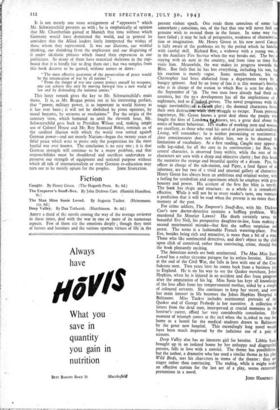Fiction
Caught. By Henry Green. (The Hogarth Press. 8s. 6d.) The Emperor's Snuff-Box. By John Dickson Carr. (Hamish Hamilton. 8s.) The Man Miss Susie Loved. By Augusta Tucker. (Heinemann. I2S. 6d.)
Deep Valley. By Dan Totheroh. (Hutchinson. 8s. 6d.) ABotrr a third of the novels coming the way of the average reviewer in these times, deal with the war in one or more of its numerous aspects. Few of them stir the emotions deeply ; though they treat of heroes and heroines and the various spartan virtues of life in the
present violent epoch. One reads them conscious of some la somewhere ; conscious, too of the fact that one will never feel an genuine wish to re-read them in the future. In some way the have failed ; it may be lack of perspective, weakness of characterisa tion or imagination. Mr. Henry Green in his new novel Craig is fully aware of the problems set by the period which he handl with careful skill. Richard Roe, a widower with a young son, is in the Auxiliary Fire Seevice when the war breaks out. The boy is staying with an aunt in the country, and from time to time Roe visits him. Meanwhile, the war makes its progress towards the Blitz. Roe feels that he has lost everything, including his son, bu his reaction is merely vague. Some months before, his son Christopher had been abducted from a department store by a hungry spinster. And by an irony of fate it is this woman's brother who is in charge of the station to which Roe is sent for duty in the September of '39. The two men have already had their en- counters, but the ne.v development has all the implications of a nightmare, and so ityliAlgai proves. The novel progresses with the tragic inevitabilitykrard aaciartatk play ; the doomed characters foster their own destrucaimiwhtlt IthelyNtruggle to escape. From personal experience, Mr. Green knows a great deal about the people who fought the fires of London& tAiknows, too, a great deal about the antics of human behaviour. FITs- studies of working men and women are excellent, as those who read his novel of provincial industrialism, Living, will remember: he is neither patronising or sentimental: class consciousness does not defeat him, nor is he daunted by limitations of vocabulary. At a first reading, Caught may appear a trifle lop-sided, for all the care in its construction • for Roe, the central character, is observed from within, while the rest of the characters are seen with a sharp and objective clarity ; but this lends the narrative the strange and beautiful quality of a dream. Pye, the officer in charge of the sub-station, and Piper, a fatal figure of an informer, are but two of a vivid and unusual gallery of characters. Henry Green has ahvays been an ambitious and original writer, with a feeling for symbolism and experiment which he employs with great honesty and power. His account of the first fire blitz is terrific. The book has shape and structure: as a .whole it it' remarkably effective. While it will not be to every reader's taste, one ventures a prediction that it will be read when the present is no mare than a memory of the past.
For crime addicts, The Emperor's Snuff-Box, with Mr. Dickson Carr's new doctor-detective contains a baffling problem. Who murdered Sir Maurice Lawes? His death certainly saves the beautiful Eve Neil, his prospective daughter-in-law, from making a second matrimonial mistake—but first she suffers suspicion and arrest. The scene is a fashionable French watering-place. Poor Eve, besides being rich and attractive, is more than a bit of a mug. Those who like sentimental detectives, and don't object to the click upon click of contrived, rather than convincing, crime, should find the book pleasantly exciting.
The American novels are both sentimental. The Man Miss Susie Loved has a rather tiresome paragon for its artless heroine. Sixteen at the end of the Civil War, she falls in love with one of the Con- federate men. Two years later he comes back from a business trip to England. He is on his way to see the Quaker merchant, Johns Hopkins, when he is injured in an accident and dies from gangrene after the amputation of his leg. Miss Susie has kept all knowledge of the love affair from her temperamental mother, aided by a couple of coloured servants. She continues to keep her secret, and soon her main interest in life becomes the Johns Hopkins Hospital In Baltimore. Miss Tucker includes sentimental portraits of the Quaker and of George Peabody in her narrative. A collection of letters from the dead man, interspersed at crucial moments in the heroine's- career, afford her very considerable consolation. Her moment of triumph comes at the en-I when she is. asked to run her home as a hostel for the medical students drawn to Baltimore by the great new hospital. This exceedingly long novel would have been much improved by the judicious use of a pair of scissors.
Deep Valley also has an innocent girl for heroine. Libbie Saul, brought up in an isolated house by her unhappy and disgruntled parents, falls in love with a convict. The theme has possibilities, but the author, a dramatist who has used a similar theme in his play Wild Birds, sees his characters in terms of the theatre: they are stagey rather than convincing. The ending, while it might make an effective curtain for the last act of a play, seems extremelY pretentious in a novel.






















 Previous page
Previous page